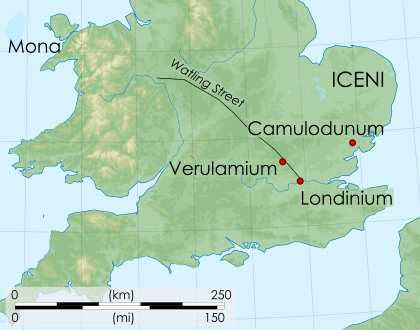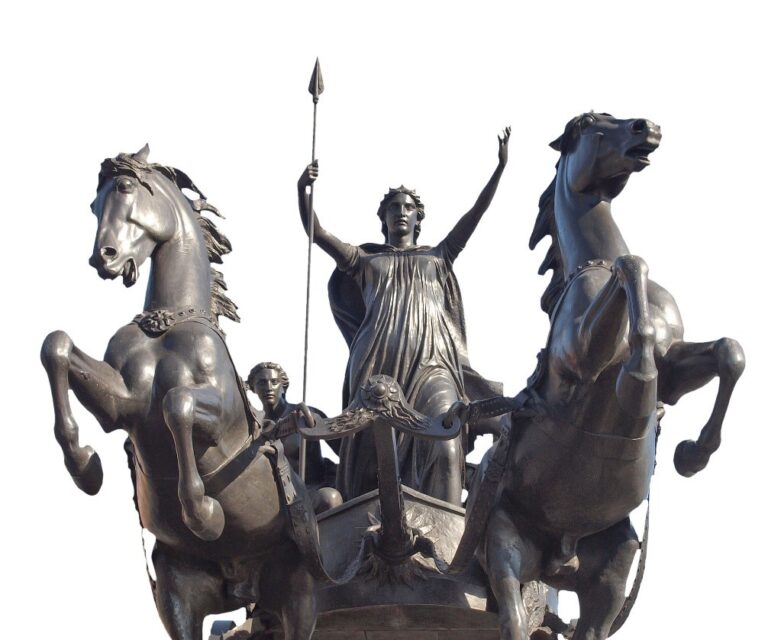Queen Boudica
Grades 1+
The village’s thatch-and-wattle homes and storage buildings are burning.
In the center of the houses is a sandal-tramped area that passes for a village square. There, Roman soldiers have stripped Boudica, queen of Iceni, to the waist. She is bent over a raised log, her hands tied to the log’s ends. The Romans flog her, the whip snapping with each strike. Her head is pulled back. They force her to watch Roman soldiers rape her two teenage daughters.
When the Romans finish, their commander, who has been seated impassively on a carved chair, tells Boudica, “Now you will better understand why you need to pay the tribute every year.”
The death of Boudica’s husband, her tribe’s king, has brought her to this horror. The Romans had conquered the Iceni, one tribe of the group called the Brittons. The Iceni had to pay the Romans money and gold every year to keep their villages from being raided and the women and children hauled away as slaves.
The people could not keep up the payments. The Romans suggest a loan. Boudica’s husband does not want Roman money. “My people will find a way to pay,” he says. But the Romans insist. They argue that they do not want the Iceni to suffer hardship trying to pay the tribute.
When the king dies, his will says that 50 percent of everything he owns will go to the Romans, thinking it will repay the loan.
But that is not enough for them. They want the loan repaid, with high interest, now.
“The loan was a gift,” Boudica argues. “Surely the gift my husband gave in return will repay it.”
In reply, the Romans send troops. They burn the village and take Boudica and her daughters prisoner.
After the rapes and flogging, the Romans begin to march away. “We will return in three months,” the Roman commander says. “And what is owed on the loan has doubled.”
The next week, Boudica emerges from the woods, where she and her daughters have taken refuge. She calls everyone together. A writer, Cassius Dio, several decades later pens what he thought she might have said:

Have we not been robbed entirely of most of our possessions? … Do we not pay a yearly tribute for our very bodies? … How much better to have been slain and to have perished than to go about with a tax on our heads!… Among the rest of mankind death frees even those who are in slavery to others; only in the case of the Romans do the very dead remain alive for their profit.
“We will fight them,” Boudica tells everyone as she finishes.
“But who will lead us?” someone asks.
“I will,” she says.

The people respond. Runners and horseman spread the word to other villages. Soon, Boudica has an army of 120,000. They march behind Boudica down Watling Street – a Roman road that connects the coast to Cornwall. They defeat the Romans at Camulodunum (now Colchester) and Verulamium (now St. Albans), and take Londonium (now London), the Roman outpost that is only 20 years old.
From all over eastern Britton come men to fight and women to cook and to tend the wounded. The size of the Iceni army expands to 230,000. “Dearest Andraste,” Boudica cries, summoning the spirit of Andraste, the goddess of Victory, “help me drive out the Romans forever.”
But it is not to be. A Roman governor, Suetonius, raises an army 10,000 and, by wisely using the lay of the land, defeats the rebels. Boudica takes poison and dies a few days later.
Test each word to see if it is a verb. Do not guess.
Tests: They ____________. It ___________.
Then highlight them in the essay.
1. is | 6. cannot | 11. Iceni | 16. of |
2. becomes | 7. main | 12. greatest | 17. women |
3. win | 8. works | 13. take | 18. him |
4. later | 9. when | 14. | 19. she |
5. speak | 10. the | 15. life | 20. are |
Some words appear more than once. You only have to mark one time.
Queen Activity 3
- Find the following words in the essay.
- Label them Sing (singular), Pl (plural), or B (both).
1. raises | 2. is | 3. pay | 4. has | 5. that |
6. called | 7. have | 8. do | 9. dies | 10. attack |